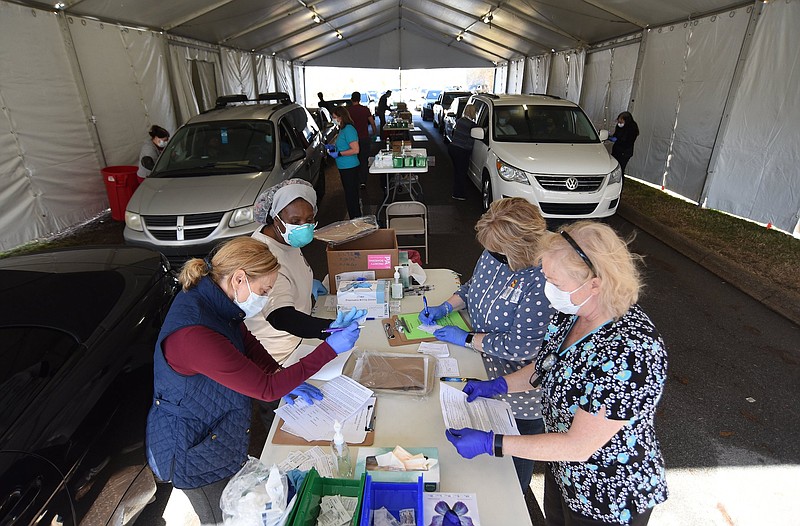Spokespeople for the Tennessee Department of Health won't say whether the new, more contagious U.K. variant of the coronavirus - which was officially reported in the state last week - has been confirmed in Hamilton County.
Baylor School research scientists believe they have identified the U.K. variant, known as B117, in patients from the Chattanooga region. Baylor scientists sent samples to the department of health for sequencing, the process used to confirm different variants, several weeks ago, but said they have not received an answer.
Last Thursday, department of health spokesperson Bill Christian confirmed that two cases of the B117 variant strain of the coronavirus were identified in Tennessee out of a total of seven specimens analyzed. Christian and other department spokespeople did not respond to additional requests asking for the name of the county or counties where those variants were detected.
When COVID-19 cases were confirmed early in the pandemic, state public health officials often shared a case's county of residence in addition to basic demographic information. For example, Tennessee's first confirmed COVID-19 case on March 4, 2020, was a 44-year-old man from Williamson County.
Dr. Aditya Khanna is an assistant professor of behavioral and social sciences at Brown University School of Public Health. Khanna, whose research focuses on modeling to better understand infectious disease transmission, said those details are important for both public health messaging and understanding of how the virus is spreading.
"I think knowing that a more transmissible version is circulating gives people an incentive to continue being careful. I think that's very, very important," he said. "I think the county level is a broad enough granularity that it doesn't violate anybody's individual privacy, but it's really important information, because I do worry that it seems that the new variant is more easily transmissible. And that's not a good thing. It opens up a lot of questions and concerns."
Khanna said the more a virus is allowed to spread, the more chance it has to mutate to a form that causes more serious illness or one that is less susceptible to vaccines.
While COVID-19 cases and hospitalizations in Tennessee have improved markedly since their peak about a month ago, the arrival of the more contagious U.K. variant threatens to reverse that trend - particularly if people begin to relax protective measures known to control the spread.
(READ MORE: US virus numbers drop, but race against new strains heats up)
Mass vaccination efforts now underway need to reach far more people before transmission slows as a result, making masking and avoiding crowds even more crucial as the new variant arrives.
It's common for viruses to mutate, causing new variants to emerge. Although B117 doesn't appear to be more deadly than the more common coronavirus variant, the U.S. Centers for Disease Control and Prevention said it's believed to be 50% more transmissible than the currently common variant.
Tennessee Health Commissioner Dr. Lisa Piercey said during a news conference Friday that the state expects the B117 variant to be the dominant coronavirus strain in Tennessee by March.
"This is what viruses do. Viruses mutate. They change. They have little spin-off siblings and cousins. They do whatever they can to try to find a susceptible host," Piercey said. "So when transmission starts going down, with any viral process, you'll see the virus mutate to get into more hosts."
Elizabeth Forrester, a Baylor research scientist, said via text that regardless of whether their samples are the B117 variant, it's a variant with a similar mutation, and Baylor is finding it with increasing frequency.
"The important point is that we know there are variants in our area that are different than what we've seen in the past. We need a lot more sequencing data to fully understand the implications in terms of public health," Forrester said.
Khanna said the emergence of new variants points to the need to ramp up our sequencing capacity. States don't necessarily have the resources to conduct proper surveillance for different variants or strains of the virus.
"It's no longer just enough to know whether somebody is COVID positive because who knows what other strains are around the corner or maybe already circulating that we don't know about," he said. "There's no guarantee any of those won't be clinically worse than the ones that are already out there."
Contact Elizabeth Fite at efite@timesfreepress.com or follow her on Twitter @ecfite.

